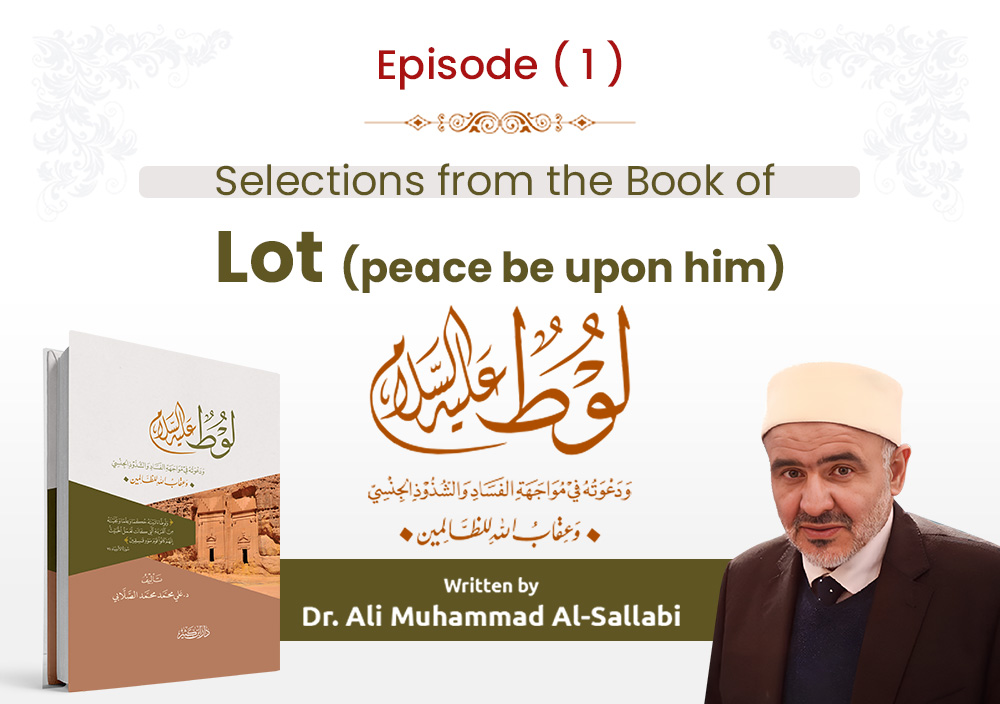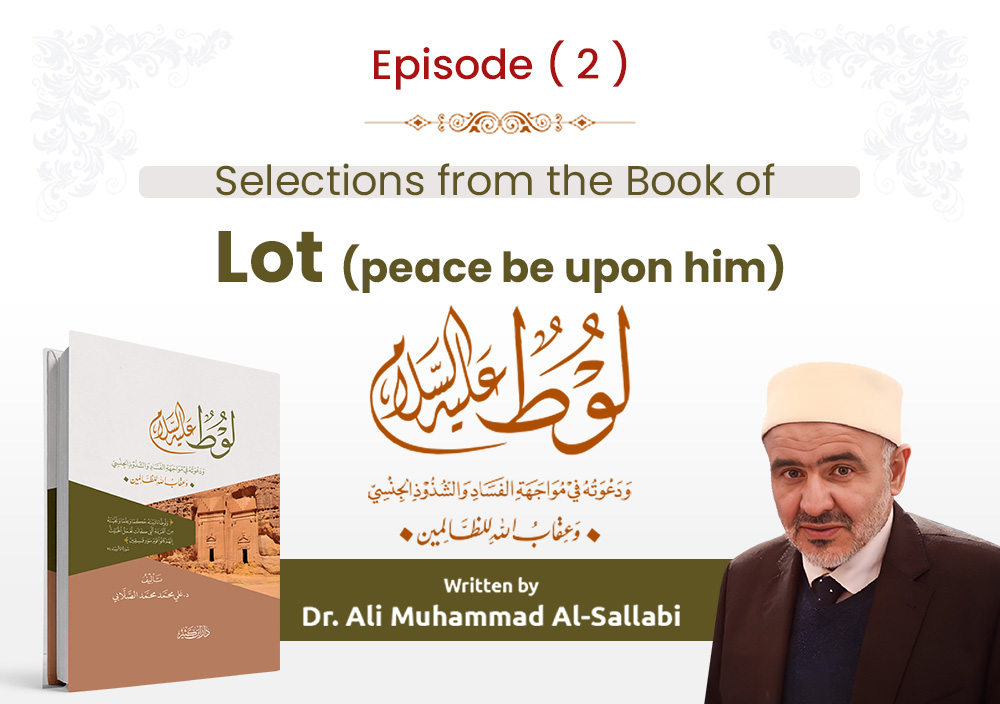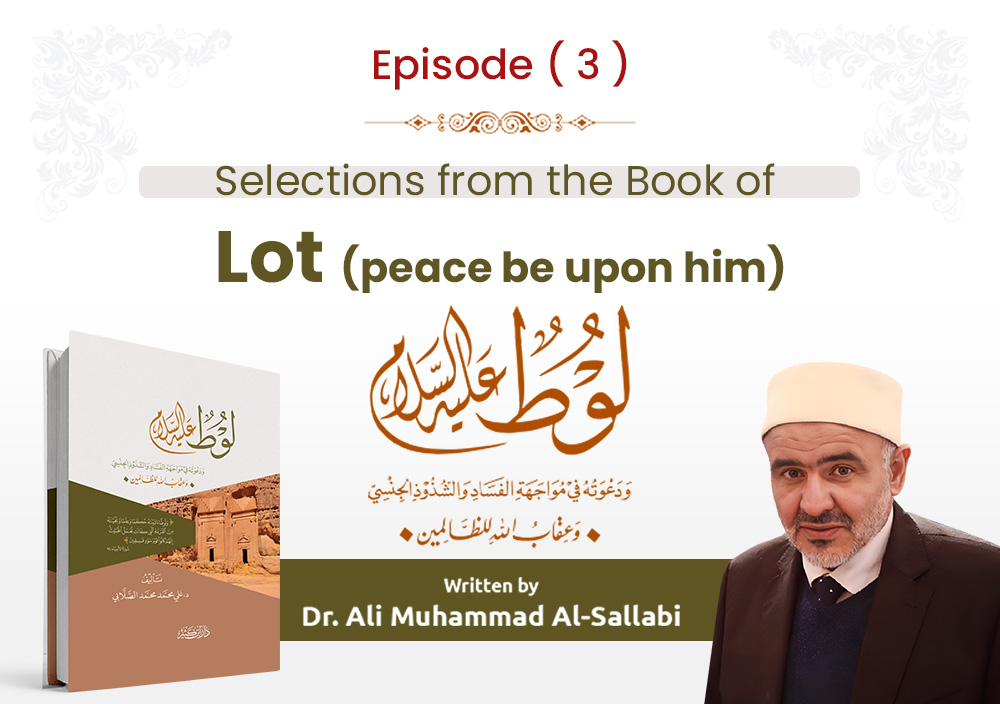The name of Lot (peace be upon him)
Selections from the Book Lot (peace be upon him) and his Mission in Confronting Corruption and Sexual Deviance …
Written by Dr. Ali Muhammad al-Sallabi...
Episode (1)
1- The name of Lot (peace be upon him) in the Holy Quran:
Lot (peace be upon him) was mentioned twenty-nine times, and the following are the names of the surahs in which he was mentioned, and the times in which he (peace be upon him) was mentioned:
- Surah Al-An'am: once.
- Surah Al-A’raf: once.
- Surah Hud: five times.
- Surah Al-Hijr: twice.
- Surah Al-Anbiya: twice.
- Surah Al-Hajj: once.
- Surah Ash-Shu’ara’: three times.
- Surah An-Nahl: twice.
- Surah Al-Ankabut: four times.
- Surah Al-Saffat: once.
- Surah S: once.
- Surah Q: once.
- Surah Al-Qamar: once.
- Surah Al-Tahrim: once.
The mention of the story of Lot (peace be upon him) in the Quran occurred on three cases:
The first case: Some details of his story with his people are mentioned, highlighting their deviation and misconduct, Lot's (peace be upon him) call to them, and then the infliction of punishment and torment upon them.
The second case: Brief references to his story.
The third case: His name is mentioned among the names of some prophets.
The details of these three cases will come - Allah willing - in the pages of this book.
2- The name of Lot (peace be upon him) according to the linguists:
There is a difference among linguists regarding the name "Lot" (peace be upon him) whether it is derived or not derived?
Al-Naqqash said: "Lot is one of the non-Arabic names, not Arabic like Abraham and Isaac."
Sibawayh said: Noah and Lot are foreign names.
Based on the above, it appears that the name "Lot" is of non-Arabic origin, and non-Arabic names do not undergo linguistic changes, as stated by Al-Zajjaj and other linguists. As for the word "laat" in Arabic; It has various derivations and meanings in the language. However, the word "Lot", which is the name of this noble prophet (peace be upon him), does not fall under the derivations of this material.
3- The difference between the name "Lot" and "Liwat" [in Arabic] (homosexuality):
Dr. Salah Al-Khaldi (may Allah have mercy on him) states that through the Quranic narrative of the people of Lot, it is evident that they committed many abominations, among the worst, most heinous, and ugliest of which was the sin of engaging in homosexual acts, which was not present among those who came before them. This sin, later known as "Liwat" [in Arabic], is now referred to in contemporary language as "sexual deviation" or "homosexuality." Some people mistakenly associate the name Lot (peace be upon him) with the sin of homosexuality, assuming that the term is derived from his name because the sin appeared among his people. However, this association is not correct, as we have clarified that the two words are not etymologically related.
Indeed, the name Lot is a foreign, non-Arabic name given to the noble prophet (peace be upon him). It is not derived from Arabic roots, nor do we seek its etymology in Arabic. It is a non-Arabic name, similar to other prophets like Noah, Abraham, Ishmael, Isaac, Jacob, and other prophets and messengers (peace be upon them). These are names of prophets sent to non-Arabic-speaking people, and they are non-Arabic names, even though they are mentioned in the Holy Quran. The presence of non-Arabic names in the Quran does not contradict the Arabic language of the Quran. These names are translated into Arabic and written in Arabic script.
The name "Lot" is acceptable and not prohibited from use, like other foreign proper names. However, "al-luwaat" is an Arabic word derived with verbal and nominal forms.
It seems that when Arabs coined the derogatory term "liwat" for the abhorrent act, they did not intend to derive it from ''Lot'' (peace be upon him), but rather from the meaning of the word in the language. Therefore, if "liwat" refers to sticking, they named the act of one man approaching another "liwat" because they cling together during the commission of such indecency.
Sheikh Dr. Fadl Hasan Abbas (may Allah have mercy on him) said: "Many people attribute those who commit this heinous obscenity, saying so-and-so is 'luti' (a sodomite), and they call them 'Lotian'. I do not find this attribution acceptable. 'Luti' is an attribution to Lot, just as 'Muhammadi' and 'Ibrahimi' are attributed to Muhammad and Abraham (peace be upon them), and 'Hashimi' is attributed to Hashim. Therefore, it is correct to say about them: 'Those who commit the act of the people of Lot' instead of saying 'Lotians' (sodomites)."
Professor Khaled Muhammad Ahmed said: "Lot is an Arabic word and he is a prophet of Allah, and his name is an ancient Arabic word meaning 'one who seeks refuge and constantly seeks refuge in Allah.'"
Episode references:
- Ali Muhammad al-Sallabi, Lot (peace be upon him) and his Mission in Confronting Corruption and Sexual Deviance, pp. 28-31.
- Qur’anic Stories: Presentation of Facts and Analysis of Events, Salah Al-Khalidi, Dar Al-Qalam, Damascus - Dar Al-Shamiya, Beirut, 1st edition, 1419 AH, 1998 AD, 1/474-480.
- Lot and his people in the light of the Qur’an and Sunnah, p. 31.
For further information and review of the sources for the article, see:
The Book of ‘’Lot (peace be upon him) and his Mission in Confronting Corruption and Sexual Deviance’’ on the official website of Sheikh Dr. Ali Muhammad al-Sallabi:




